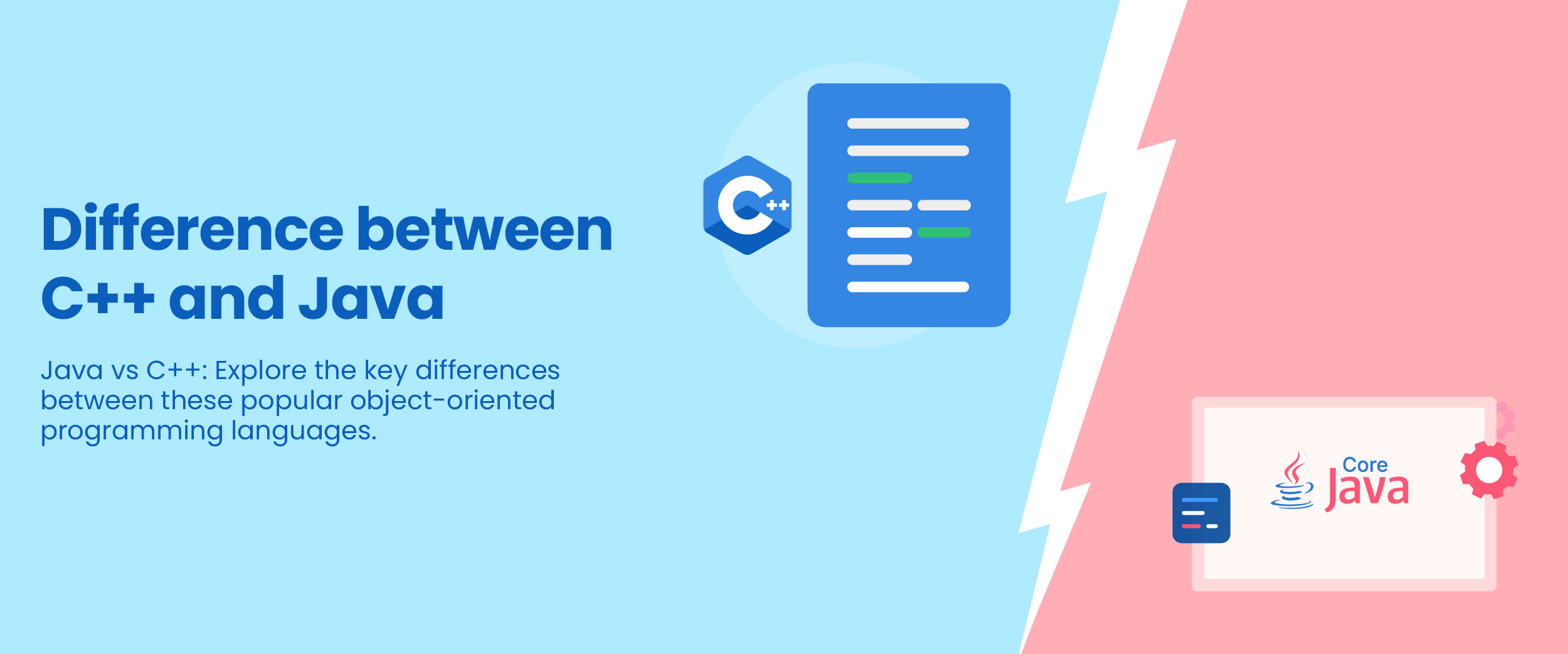C++ vs. Java- Which is Better?
Among the vast spectrum of computer languages, C++ and Java stand out as two powerhouses that have shaped the software development industry. Both languages have unique qualities, strengths, and application areas. Understanding the difference between C++ and Java is essential for developers, aspiring programmers, and technophiles. In this blog, we will compare the syntax, performance, memory management, platform compatibility, and application areas of these two languages.
Join us on this interesting journey to discover the intriguing difference between C++ and Java, whether you’re just getting started with coding or want to brush up on your abilities.
C++ and Java: An Overview
C++ and Java are prominent programming languages. C++ is renowned for its efficiency and power, enabling low-level memory manipulation alongside high-level abstractions. It’s often employed in system-level programming, game development, and resource-intensive applications. Consider taking an online C++ course to learn more.
Java, on the other hand, emphasizes portability and readability, featuring automatic memory management. It’s widely used in web development, enterprise software, and Android app creation. While C++ grants more control over hardware, Java offers platform independence and a strong focus on object-oriented programming, making both languages vital choices based on project requirements and priorities. Consider taking an online Java course for better understanding.
Java vs C++
While both C++ and Java are widely used programming languages, each of these has its own unique traits that make them distinct from each other.
| C++ | Java | |
| Type | General-purpose programming language | General-purpose programming language |
| Paradigm | Multi-paradigm (procedural and OOP) | Object-oriented programming (OOP) |
| Performance | Efficient and performance-oriented | Slower compared to C++ |
| Memory | Manual memory management | Automatic memory management (garbage collection) |
| Platform | Platform-dependent | Platform-independent (requires JVM) |
| Standard | Standard Template Library (STL) | Extensive standard library (Java Development Kit) |
| Community | Large and active community | Large and active community |
| Learning | More complex syntax and learning curve | Easier syntax and beginner-friendly |
| Application | System software, game development, and performance-critical applications | Web development, enterprise applications, and Android development |
| Low-level | Direct memory manipulation, pointers | Abstracts away low-level programming capabilities |
| Portability | Platform-dependent, less portability | Platform-independent, high portability |
| Security | Less secure due to direct memory manipulation | Robust security features (sandboxing, bytecode verification) |
Advantages of C++ and Java
C++ and Java both have their own set of advantages. The decision between them is influenced by variables such as project requirements, performance requirements, platform compatibility, and developer preferences.
| C++ | Java |
| Powerful and Effective: C++ is a highly effective and performance-oriented programming language that supports low-level programming and direct memory management. | Platform Independent: Every platform that supports a Java Virtual Machine (JVM) can run Java programs. |
| Object-oriented Programming (OOP): C++ has OOP features that help with code organization and reuse. | Strong Standard Library: Java has a sizable standard library (JDK) with a wide variety of classes and methods. |
| Control Over System Resources: C++ features like pointers provide developers with fine-grained control over system resources. | Automatic Memory Management: Java uses garbage collection to manage memory automatically, doing away with the challenges of manual memory management. |
| Extensive Community and Resources: Large and active community, as well as a plethora of tools, libraries, and frameworks: C++ has a large and active community, as well as a plethora of tools, libraries, and frameworks. | Strong Security Features: Java has a strong security paradigm that includes technologies like bytecode verification and sandboxing to ensure secure program development. |
| High Performance: Because C++ can generate efficient low-level code, it is suited for high-performance applications and system software. | Wide Range of Applications: Java is suited for a wide range of applications, including desktop software, online applications, mobile apps, and so forth. |
Disadvantages of C++ and Java
Each of the languages has limitations, and the selection is influenced by the project’s context and goals.
| C++ | Java |
| Complicated Memory Management: C++ requires manual memory management, which can lead to problems like memory leaks and undefined behavior. | Slower Performance: Because the JVM interprets bytecode, Java programs might be slower than C++ applications. |
| Lack of Built-in Garbage Collection: In contrast to Java, C++ lacks built-in garbage collection, forcing developers to manually handle memory allocation and deallocation. | JVM Overhead: Java programs necessitate the presence of the JVM, which adds an extra layer of abstraction and can result in increased memory use. |
| Complexity and Learning Curve: Because C++ is a complex language with comprehensive syntax, it is more difficult to learn and understand for novices. | Lack of Low-level Programming Skills: Java abstracts away low-level programming features such as direct memory manipulation, and restricting system resource control. |
| Limited Standard Library: The C++ standard library is not as broad as Java’s, forcing developers to rely more on third-party libraries and frameworks. | Dependency on the JVM: Java programs rely significantly on the JVM, which limits portability to systems that have a JVM. |
| Lack of Platform Independence: Because C++ code must be generated for specific platforms, portability across various operating systems is limited. | Increased Memory Consumption: When compared to C++, Java’s automated memory management can result in higher memory consumption. |
Applications of C++ and Java
It is important to know the various uses of C++ and Java while you are learning the programming languages.
| C++ | Java | |
| System Software | Operating systems, device drivers, embedded systems, system software, and firmware | Enterprise applications, web applications, Android applications, and server-side development |
| Game Development | Game development, game engines, graphics programming, virtual reality (VR) | Mobile game development (Android), cross-platform game development |
| Performance Critical Applications | High-performance applications and real-time systems used in the aerospace and automotive industries | High-traffic websites and financial applications |
| Scientific Computing | Scientific simulations, computational modeling, and numerical analysis | Scientific research, data analysis, machine learning, and big data processing |
| Finance | Financial systems, algorithmic trading | Financial applications, banking systems |
| Networking | Network programming, routers, and telecommunication | Network applications, distributed systems |
Java or C++: Which is better?
Depending on the particular setting, needs, and objectives of the software development project, Java or C++ can be preferable. Both languages have their advantages and uses. Here are some things to think about:
- Platform independence, automated memory management, a large standard library, and robust security measures are some of Java’s best qualities. It excels in web development, Android programming, and enterprise apps. Java is a great choice for projects that value portability, security, and ease of development due to its simplicity, sizeable community, and beginner-friendly syntax.
- C++ provides enhanced resource management, effective performance, and low-level programming abilities. System software, game development, and performance-critical applications are all good fits for it. C++ is a popular language for tasks that call for high performance and fine-grained control over hardware due to its flexibility, speed, and robust features.
Conclusion
The difference between C++ and Java includes a variety of aspects that can have a substantial influence on software development initiatives. C++ is suitable for system software, game development, and performance-critical applications because of its efficiency, low-level programming features, and versatility. Java, on the other hand, is a popular choice for corporate applications, web development, and Android programming because of its platform independence, automated memory management, big standard library, and strong security features.
Understanding how Java is different from C++ enables developers to make educated decisions based on project objectives, performance constraints, and platform compatibility, resulting in effective software solutions in today’s diversified technological world.






